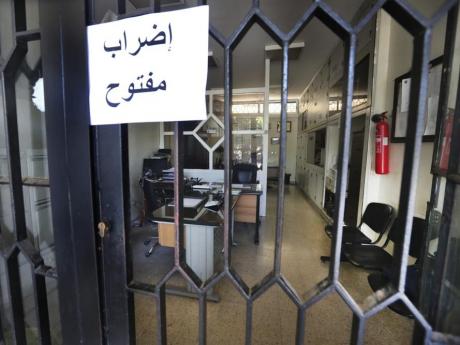Public sector strike cripples cash-strapped Lebanon
BEIRUT (AP) — Tarek Younes was once solidly middle class and felt he helped contribute to society as an inspector in the Lebanese government's consumer protection agency.
But the country's economic free-fall has eroded his income and civic pride.
In his desperation, Younes has joined tens of thousands of public sector employees across the country in an open-ended strike that has already lasted for six weeks.
The protest of the civil servants who form the backbone of government signals further erosion of Lebanon's public institutions, already struggling to afford their most basic operating costs.
The strike gives a bleak preview of how Lebanon could sink even deeper, should officials continue to delay decisive action on key financial and administrative reforms sought by the International Monetary Fund to make Lebanon's comatose economy viable again.
Meanwhile, the protest further disrupted life in Lebanon, with even the most basic government services on hold.
Court cases have been delayed.
Identity cards, birth certificates and school transcripts are not being issued.
Air traffic controllers announced that they would stop working nights in August.
Over the past year, public transportation drivers and public school teachers held unsuccessful sporadic strikes and protests, which they hoped would be a wake-up call for government.
“I don't know how we're thinking about economic recovery, if you have that many people who were once middle class now living in poverty,” Younes told The Associated Press.
“We are extending our hand and making compromises, but the government needs to do so as well and give us some of our rights.”
Many point to decades of corruption and nefarious financial management as a cause for Lebanon's economic downward spiral, now in its third year.
They say a handful of members of Lebanon's ruling elite caused the world's worst economic crisis since the mid-19th century, with three-quarters of the population now considered poor.
The government has not increased wages for public sector workers since the onset of the country's fiscal crunch in late 2019, during which the Lebanese pound lost over 90% of its value against the dollar.
On top of that, food, gasoline and medicine prices are up sharply due to high inflation.
Follow The Gleaner on Twitter and Instagram @JamaicaGleaner and on Facebook @GleanerJamaica. Send us a message on WhatsApp at 1-876-499-0169 or email us at onlinefeedback@gleanerjm.com or editors@gleanerjm.com.

